© Turkuvaz Haberleşme ve Yayıncılık 2024
The United Nations reported Friday that Asian drug trafficking networks are increasingly utilizing sea routes to smuggle methamphetamines out of Myanmar, while simultaneously escalating ketamine production, as part of their expansion efforts.
Meth from coup-hit Myanmar's northeastern Shan state – the regional epicenter for the drug's production – is being smuggled by boats to avoid tighter patrols on land routes through China and Thailand, the UN Office on Drugs and Crime (UNODC) said in an annual report.
The border region between Myanmar, Laos and Thailand has long been a hotbed of illegal drug production and trafficking, particularly of meth and opium.
Increased drug patrols in China's southwestern Yunnan province and along Thailand's border with Myanmar led to a drop in meth seizures by Chinese and Thai authorities in 2022 as drug traffickers turned to alternative maritime routes.

"Traffickers have continued to ship large volumes through Laos and northern Thailand, but they have pushed significant supply through central Myanmar to the Andaman Sea where it seems few were looking," UNODC regional representative Jeremy Douglas said.
The report flagged high volumes of Myanmar-made meth heading into Bangladesh and India.
Health experts say the use of the drug can lead to paranoia, hallucinations and violent behavior and those withdrawing can experience psychosis.
Police across East and South East Asia seized nearly 151 tons of methamphetamines in 2022, down from the record of 172 tons set in 2021.
Wholesale and street prices for meth across the region fell or remained at record lows in 2022.
"The most powerful regional trafficking networks are able to operate with a high degree of certainty they can and will not be stopped," the UN report said.
Researchers also pointed to evidence that drug smuggling networks are looking to diversify what they sell.
In 2022, authorities across the region seized a record 27.4 tons of ketamine, an anesthetic misused as a recreational party drug – up 167% in 2021.
"The discovery of a series of industrial-scale clandestine ketamine laboratories, processing warehouses, and storage facilities across the country has set off alarm bells in the region," the report said.
Large mixed shipments of meth and ketamine indicate organized crime groups are trying to push the two drugs as a package to increase demand for the anesthetic, according to the report.
